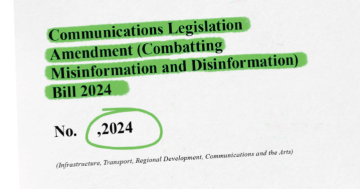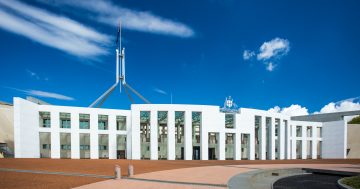A slightly earlier version of this article first appeared in En Passant.
$50,000 fines for postering. That’s what Labor’s A.C.T. Chief Minister and civil libertarian Jon Stanhope is proposing in a new Bill. The Bill is an attack on free speech.
The $50,000 would be for companies. If Stanhope gets his way, the fine will be $10,000 for individuals.
Police and rangers would get the power to issue $250 on-the-spot fines. This is unlikely to be used in practice since most postering occurs at times when cops and other officers of the state are not around.
In any event, $250 is a lot of money for political and community groups trying to get their message out to a wider public. A $10,000 fine will destroy most community and political organisations in the ACT (other than the pokie supported ALP and the business supported Liberals).
The new laws if passed will apply to all bill posters – from major event organisers who print off thousands of their advertisements and employ groups to splatter them everywhere to people sticky taping missing cat and dog notices on poles at the local shops.

In between are political and community groups whose members put notices up about forthcoming events.
Clearly there are not enough public notice outlets in Canberra. The architectural eyesore that is Civic has two, for a population of 310,000.
Part of the problem here is that most citizens are denied a voice or an outlet for their voice. Only the rich (or those who have backing from poker machine funding like Canberra Labor or from business like Canberra Labor and the Liberals) can own or participate in major media outlets.
So political and community groups which have little money need public spaces and other outlets in the media for their messages. Canberra Labor denies them this.
The laws are so bad that the Scrutiny of Bills committee quoted comments it had previously made on similar provisions and urged current Assembly members to use these comments as the basis for questions of the Government about the failure of the Bill to address Human Rights concerns. The Committee said in part:
- HRA subsection 16(2) provides that “everyone has the right to freedom of expression”. It is arguable that at least some of the acts that may constitute the physical elements of the offence (of affixing, etc) are each an exercise of the right to freedom of expression. That is, some such acts will amount to an attempt to convey or attempt to convey a meaning (footnotes omitted).
- The question then is whether the limitation of this right is in the circumstances justifiable under HRA section 28. In very general terms, section 28 requires that any limitation or restriction of rights must pursue a legitimate objective and there must be a reasonable relationship of proportionality between the means employed and the objective sought to be realised.
The Committee elaborated, and noted that in relation to both limbs of section 119, there was a question whether the provision was a disproportionate means of controlling the affixing of placards, etc. It noted in particular that some forms of such expression have a high value where they were directed to conveying a political message, and commented that this factor makes it more difficult to support a finding of proportionality.
Put simply, the proposed bill postering crimes may well infringe on the right to political free speech.
The proposed crimes would also be strict liability. This means intention is irrelevant. Again this raises human rights concerns.
The Greens and the Liberals (who have the numbers in the ACT Legislative Assembly) referred the Bill to a Standing Committee to investigate these issues.
Community and political groups are organising against the draconian nature of the Bill. I ‘d like to see the Greens organise public opposition to this Bill and call a demo against Stanhope’s attack on free speech.
Applying the law only to for profit organisations is one obvious response if you want to stop these rich and not so rich event organisers from putting thousands of their posters advertising dull DJs and drunken discos all over the city.
Markedly increasing the number of public spaces for community and political notices is another obvious response.
Imposing requirements on all media in the ACT to provide free outlets for community and other groups (including political groups) would be a more democratic response; one which Canberra labor would never consider let alone take.
With the ongoing State attacks on free speech, outlets like RiotACT, committed to community expression, become more vital.
So let’s organise and keep the pressure on our elected representatives to stop this attack on free speech.
Over to you Greens.





















